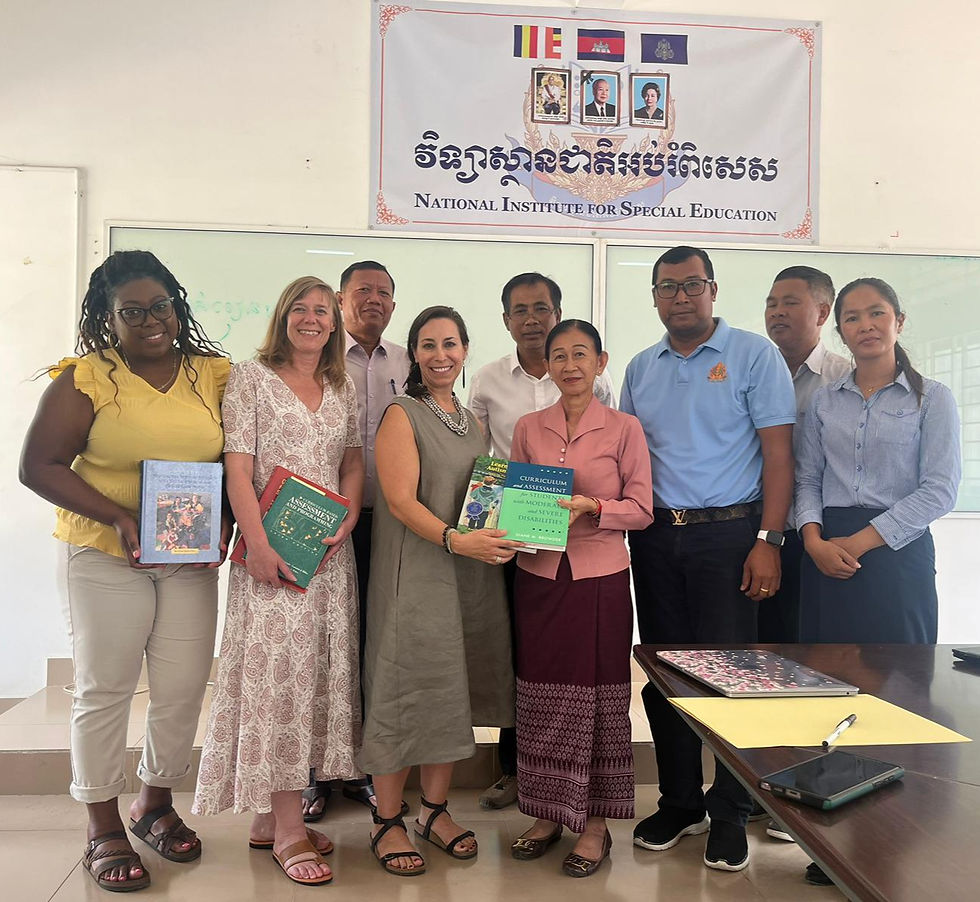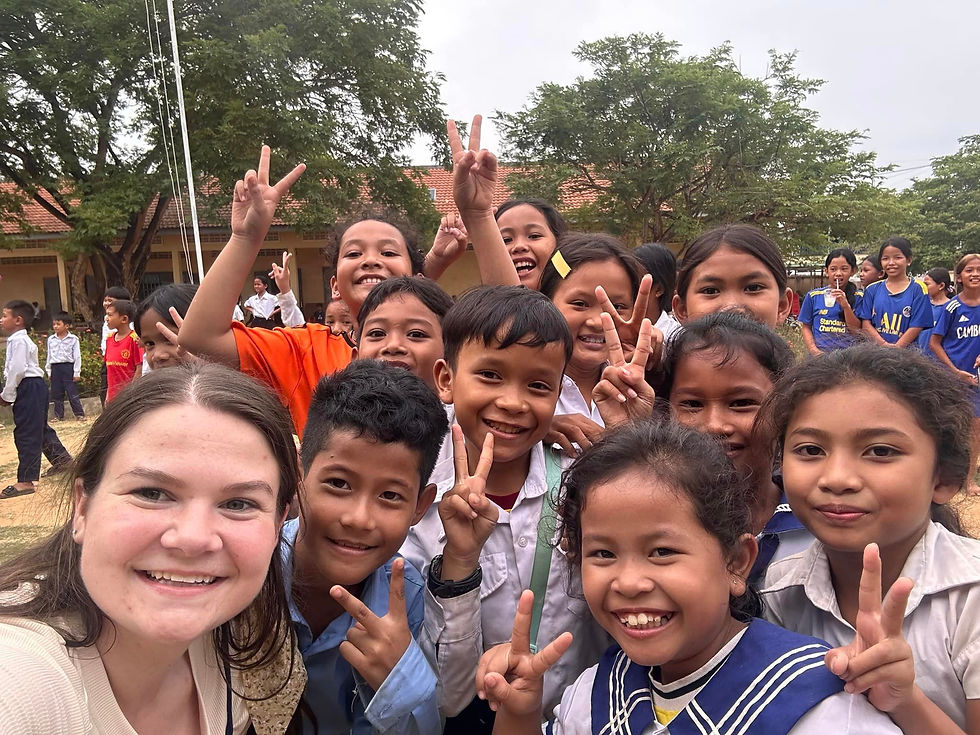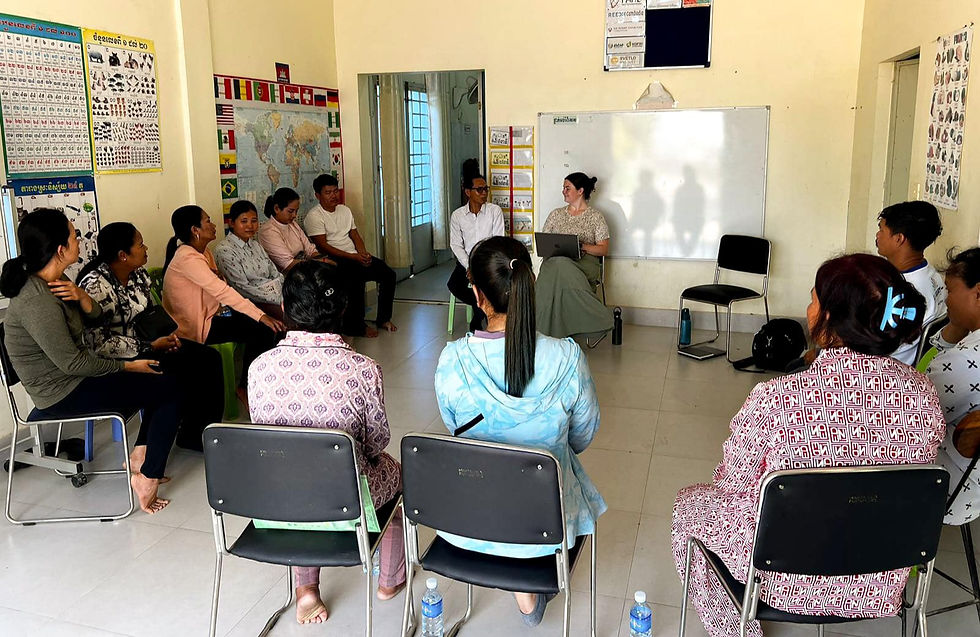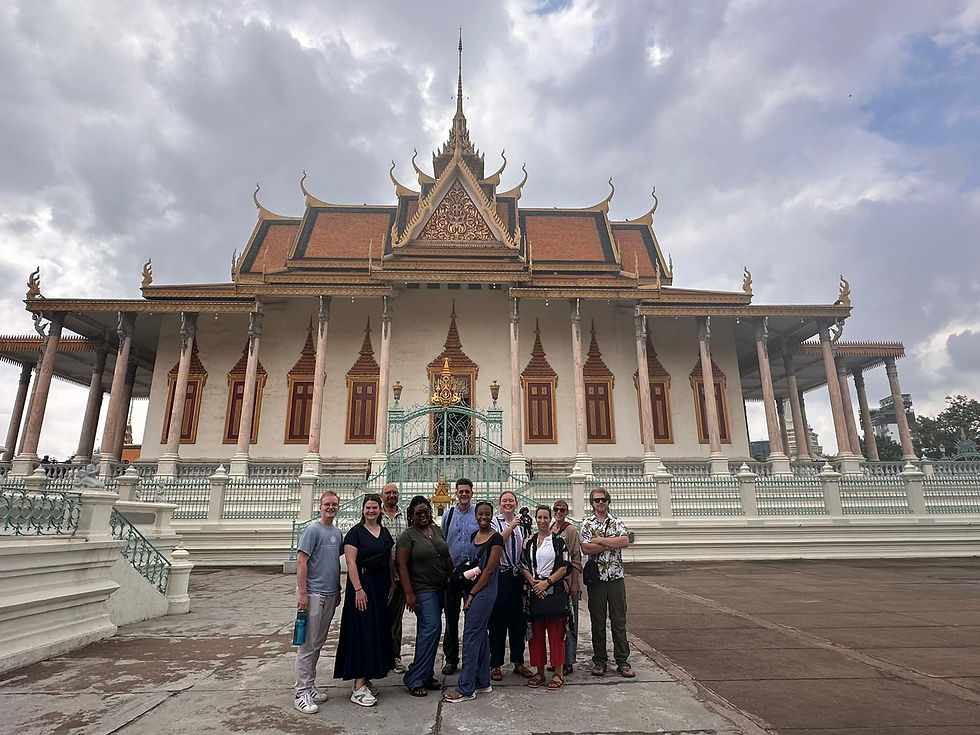Reflections from the Field, May 2024
- DSI Team

- Jul 14, 2024
- 5 min read
A team of ten faculty and students from East Tennessee State University (ETSU) and the University of Georgia Center for Autism and Behavioral Education Research traveled to Cambodia in May 2024. For two weeks, the team worked with DSI's partner organizations to support our ongoing training work with Cambodian teachers and children with disabilities, spending time in classrooms in both urban and rural communities.

We asked our travelers to share their experiences with us. Julie Sears, Pamela J. Mims, and Kayla Chambers reflected on what they’d expected from their visit and what they learned.
For Julie Sears, PhD, an instructor at ETSU and coordinator for the East Tennessee Leadership Education in Neurodevelopmental Disabilities (LEND) program, Cambodia was the twenty-sixth country she’s visited. It was her first time in Cambodia, but previous trips to the region have taken her to Malaysia and Vietnam. There were multiple reasons she and her students participated in this two-week journey, she explained. “First, we feel it is important for our students to experience other cultures and see what other education settings look like.

Additionally, after working with NISE (the National Institute for Special Education, which is part of the Ministry of Education in Cambodia) and DSI on a smaller training project, we wanted to see the amazing things and better understand the challenges happening in Cambodia’s special education system.”
While recognizing that there is still work to be done, Sears was impressed by the progress being made in Cambodia.
“What I found interesting in meeting with the NISE officials,” she said, “is that they had a vision for special education to be under the supervision of the government. Through my research of special education in other countries, I have read that when education is left to NGOs, often there is no way to monitor the quality and care provided to the children.
Although adopting this new system is a momentous task, with many challenges, their leadership is invaluable to the future of many children.”
Sears described the teachers and students as “welcoming, kind, friendly, and curious.” She was struck by the inventiveness of the educators. “Teachers worked with whatever supplies they had,” she explained, adding that this prompted her to reconsider the perceived necessity of high-tech devices. “For example,” she continued, “a student and I worked together to make some communication cards by using free communication picture websites and then printing them at the local print shop.” Without the funds for tablets or other electronic solutions, the ancient art of paper offered a solution.
When asked what she would remember most about the trip, Sears revealed an adventurous streak, reporting that she had walked with elephants, tried tarantulas, and visited the famous Angkor Wat. But she concluded that her favorite moment in the classroom “was when a young man broke out into traditional song and dance for us. He did such a great job! I hope he gets many inclusive experiences showing off his talent.”

Pamela J. Mims, PhD, Associate Dean of Research and Grants and Professor of Special Education at ETSU, has visited many countries (including neighboring Vietnam), but this was her first trip to Cambodia. Before departure, she researched Cambodian culture and history, wanting to learn more about “how the history may have shaped the current culture.” She was eager to participate in the trip, saying, “I love opportunities to focus on reciprocal community-engaged opportunities, where I can learn and also share with others.”
Mims was thus looking forward to learning from the teachers and students in Cambodia - about the culture, the education system, and what life was like for children with disabilities. She reported learning even more than she’d expected. The teachers she met were “resourceful, resilient, willing to learn, willing to share.” In a word, Mims said, the teachers were “amazing.”
Resilience and resourcefulness were necessary - Mims explained, “I thought I understood rural [life] and poverty but was not prepared to see what the reality was with students in the rural setting, especially at the daycare.
I didn’t realize that simple things like wheelchairs and other everyday equipment would not be readily available. As a result, I’m brainstorming ideas to get equipment into the areas of high need in Cambodia.” Nonetheless, Mims noted a sense of positive energy, remembering “how happy the kids were at all of the schools, despite some of the situations they were in. They were incredibly excited to meet us, as we were to meet them.”

Kayla Chambers, a clinical nutrition graduate student at ETSU, joined the team and made her first trip to Asia “to develop her professional skills.” She explained that she “wanted to experience a new culture and learn how clinical nutrition can be similar and different in different parts of the world.”
Like Sears and Mims, Chambers prepared by researching Cambodian history and culture, but she also investigated “nutrition-related information” and local food practices; she “learned about what a typical meal looks like and what food groups were commonly included,” information that she then incorporated into her presentations.
Anticipating questions that might have different answers outside the US, Chambers kept an open mind and considered alternative solutions. She might have recommended tube feeding for children who coughed, gagged, or had other difficulties with food, but because that option was not available, she reported, “I suggested other ways to adjust the food to make it as safe as possible for those who had trouble chewing or swallowing. I gave examples such as serving soft or pureed foods and using exercises to strengthen the oral muscles to aid in chewing.”
In fact, discussing ways to interest children in trying new foods was a highlight of Chambers’s time in Cambodia. Recognizing the many access shortages in the country, she learned the

importance of “meeting families where they are,” noting that “there would be no point in telling a family to go see a doctor if they are unable to travel or afford to go.” Instead, she said she will continue to think of ways to help parents develop new skills that will help them help their children. “While in Pursat,” she recalled, “I had an amazing presentation/ discussion with parents. They shared their challenges with me, and we worked together to find ways to get their children interested in mealtimes and eating new foods.” The conversation was collaborative, as parents shared techniques that had worked for them and listened to suggestions from Chambers and each other.
“I will always carry the importance of having an open mind and hearing the challenges each individual person has, to work together to find ways that are achievable and work best in their life,” Chambers concluded.

DSI thanks everyone who made the May program such a success - the students and teachers in the US and in Cambodia.
_edited.png)



Comments